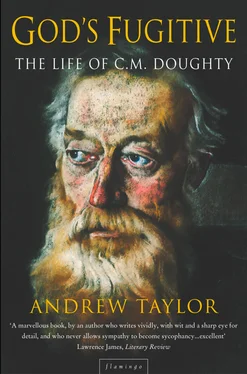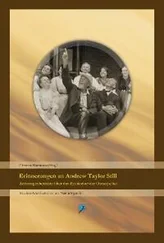His rejection seems to have shocked the staff at Beach House as well. During the following year his maternal aunt, Miss Amelia Hotham of Tunbridge Wells, was assured that he was ‘the very best boy that we have met with’. Even allowing for a degree of tact in dealing with pupils’ close relatives, it is a verdict that suggests that Doughty’s teachers, at least, believed that the navy had missed a good candidate.
Their sympathy, however, must have been of very little consolation to a boy who had seen his ambition snatched away from him, whose elder brother had by now started a career at sea, and who was still all too conscious of his cousin’s steady progress in the service. It must have been hard, too, to be surrounded by his contemporaries, who would have been looking forward to their own careers as naval officers. A few months after the examination board’s decision he was taken out of the school, and started a course of study with a private tutor.
Clearly, he and his family had decided that if he could not follow one family tradition by joining the navy, he should follow another by going up to his father’s old college at Cambridge, Gonville and Caius. Preparation for that involved a degree of formal, structured study, and the records of King’s College, London, show the young Doughty lodging in a suitably respectable boarding house in Notting Hill, 17 while he followed a mathematics evening course at the college.
But Doughty remained the prosperous son of a prosperous family, and much of the time between Beach House and Cambridge, his widow said later, was passed in travelling with his tutor through France and Belgium. They were travels that not only gave him his first taste of foreign languages outside the classroom, but also established the connection in his mind between study and the wandering life. Perhaps it was on the roads of northern France that much of the character of the scholar gypsy was formed.
More crucially, though, he returned to the chalk countryside of his home in Suffolk. During his school holidays at his uncle’s home in Martlesham or on the Newsons’ farm in Theberton, he had amused himself by digging for fossils and stone artefacts – a very fashionable pastime as the revelations of Charles Darwin about evolution were echoing around the world. Now Doughty started geological and archaeological studies in earnest around the village of Hoxne – ‘working a good deal with the microscope’, he told a correspondent later. 18 In 1862, while still only nineteen years old, he submitted a paper to the Cambridge meeting of the British Association for the Advancement of Science on Flint Implements from Hoxne .
It was an ideal place to start. More than sixty years earlier the little Suffolk village, recognized today as one of the most important archaeological sites in Europe, had seen the discovery of some of the first stone axes found in Britain; in 1860 those discoveries were being linked with others made in France, to revolutionize the accepted view of prehistory. Humanity, the researchers demonstrated, had a much longer pedigree than anyone had believed. 19
It was a controversial, even revolutionary subject, and the decision Doughty made now reflected the self-reliance that had been forced on him by a bleak and lonely childhood, the toughness that the disappointment at Beach House had given him, and the straightforward determination that was already a part of his character. Practically everyone who came into contact with Doughty throughout his life commented on his diffidence – his friends were later to refer to him dismissively as a ‘shy dreamer’ 20 – but his arrival at Cambridge University showed that his reserved manner hid a rocky determination.
The Admissions Book in the archives of Gonville and Caius College, Cambridge, shows ‘Carolus Montagu Doughty’ accepted as a new member of the college on 30 September 1861. It was the college that his father and his grandfather had attended before him, but Doughty was determined not simply to follow in their footsteps. It was only two years since Charles Darwin’s Origin of Species had outraged the certainties of the Established Church with which Doughty had such close family links, and the study of science was still considered barely respectable in the university – and yet it was on the newfangled Natural Science tripos that he decided to concentrate.
His expeditions and diggings in Suffolk had already made him a dedicated geologist and collector of fossils, and he was determined to develop this interest from the start of his Cambridge career. It cannot have been a welcome ambition in a family as steeped as his in the reassuring traditions of Church and countryside.
It is Darwin who is chiefly remembered today as the man who shivered the comfortable theology of the Church of England to its foundations, but more than twenty-five years before On the Origin of Species appeared, Charles Lyell had dealt another blow with his Principles of Geology . It is hard to overstate the impact of the new science on the intellectual life of the time: Lyell’s contention that the earth was still changing and developing after hundreds of thousands of years had broken upon a world where eminent churchmen referred to ancient texts and confidently named 23 October 4004 BC as the precise date of Creation, while Darwin’s challenge to the story of Adam and Eve seemed to strike at the very basis of Christianity.
People struggled to hold onto their faith, and John Ruskin spoke for many of them when he declared, ‘If only the geologists would let me alone, I could do very well – but those dreadful hammers! I hear the clink of them at the end of every cadence of the Bible verses!’ 21 And the geologists themselves felt the draught of their studies upon their own beliefs. In a letter to Darwin, written in the mid 1860s, Lyell said wistfully: ‘I had been forced to give up my old faith without thoroughly seeing my way to a new one.’ 22 It was a common dilemma, and one which struck particularly hard at a young man like Doughty, passionate in his sense of tradition, yet unswerving in his search for truth.
Doughty had grown up with the rhythms of the Authorized Version echoing in his mind, and his whole instinct was to look back, not forward, for reassurance – but it was in that dreadful clink of the geologist’s hammer that he found inspiration. The whole discipline of geology, and the study of natural science itself, was unsettling, revolutionary, and frequently in direct conflict with the teaching of the Church – but it fascinated Doughty.
As a child, he had been gripped by the idea of the navy and his family tradition of military service. Later, it would be Arabia, and then the story of the Roman conquest of Britain. Doughty would continue to focus his attention upon some particular subject and, over a period of years, would immerse himself in it, teasing out every last detail, before passing on, his attitude to life altered and enriched by the experience, to some new study. Time was not significant – the writing alone of The Dawn in Britain took almost ten years of his life, and the research beforehand at least as long again – but while the fascination was upon him, his obsession would be virtually total.
The shy and diffident young Doughty seems to have made little impression in his early days at Cambridge. He found it hard to make friends with his fellow students – and at the same time he showed no sign of incipient brilliance as a scholar. The Caius examination records show him stumbling uneasily through his first examinations – 27th out of 32 in Classics, 19th of 34 in Theology and, despite his efforts at King’s College, London, 30th of 35 in Mathematics. But from the very start there was no doubt where his greatest interest lay. 23
Читать дальше












